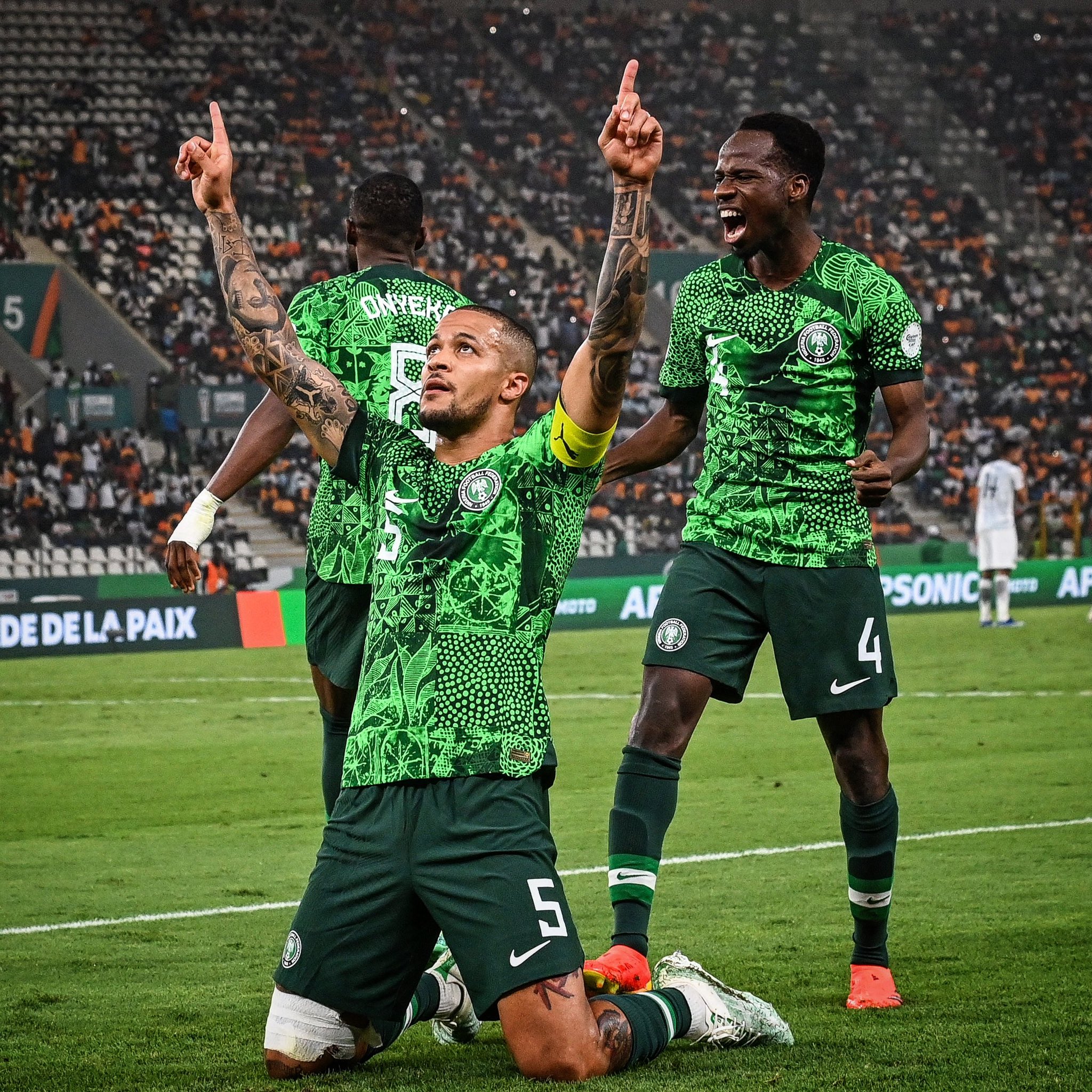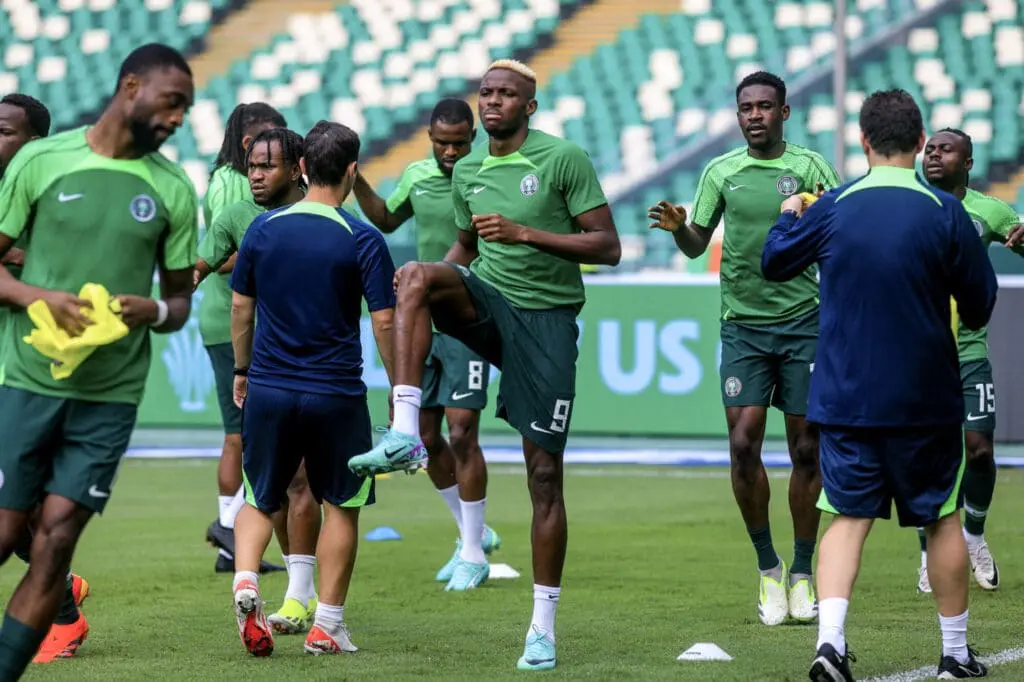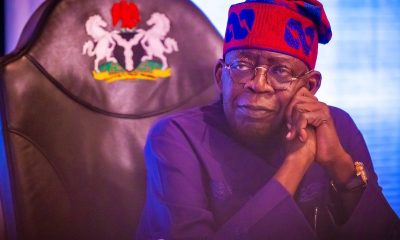Article
Let’s play football

By Chris Gyang
In more ways than one, this is Nigeria’s Africa Cup of Nations (AFCON). Its beautiful outcomes should serve as a fulcrum for addressing some of the current, critical, challenges confronting the country.

As things have literally played out so far in the on-going continental fiesta, there is no gainsaying the fact that this has proved to be one of Nigeria’s most spectacular outings in recent times.
This has confounded most Nigerian football enthusiasts, cynics and even aficionados who never gave the team a chance of making any significant impact.
They reasoned that, just as the economy, security and other indices of national development have continued plummet irrevocably, our football could not be an exception.
Indeed, there is very little to cheer about in Nigeria these days.
Only the other day, house wives brought out youth onto the streets of Mina to protest the extreme economic hardships under which they are living.
A day later, another demonstration erupted in Suleja, the commercial nerve-centre of the state. This time around, the youth took centre-stage.
It was something of a surprise that those public displays of disenchantment with the country’s leaders resonated with people across the country – if reactions on social media are anything to go by.
But the police arrested the woman who led the first protest, Aisha Jibrin, and 24 other men for what they described as “organizing a violent protest.”
And although the 25 were later released, that sordid episode once again underscored the sinister dimension the issues of citizens’ rights are taking in the country.
To think that football could not follow the pervasive trend or offer any consolation in these bleak times would only amount to painfully wishing for the impossible.
Most Nigerians had ceased to invest any more hope in their leaders due to the strings of dashed promises they had had to endure since the inception of the current democratic dispensation in 1999.
Therefore, Nigeria’s national football squad had to battle opponents on the pitch and an overwhelming sense of despondency back home.
AFCON could not have come at a more auspicious time for Nigeria.
Moreover, the tensions, bitterness and divisions caused by highly fractious 2023 general elections had not completely dissipated.
Not to mention the added lacerations inflicted by some of the controversial decisions of the elections tribunals and appellate courts that followed.
AFCON has provided the much-needed balm that has soothed Nigerians’ frayed nerves and restored some measure of national unity – even if fleetingly or for the duration of the tournament.
Being a traditionally football crazy country, this temporary respite will certainly do a lot of good to majority of citizens and the country as a whole.
And that relief came in a very forceful way, through that dramatic, nail-biting and tension-soaked February 7 derby between Nigeria and South Africa.
To say that these two African giants are rivals is an understatement. Their rivalry simply goes far beyond the football pitch.
Last Sunday, a budding South African musician, Tyla, triumphed over a galaxy of Nigerian superstars to clinch the much-coveted Grammy Award for Best African Music Performance for her hit song, Water.
Typically, this riled Nigerians considerably.
It brought back bitter memories of the series of xenophobic murders of innocent Nigerians in South Africa, which the authorities have consistently done little to curb or prosecute the perpetrators.
In the lead-up to the February 7 cracker, the Nigerian High Commission in South Africa issued a stern warning to Nigerians in that country to be mindful of the way they celebrate Nigeria’s victory or lick their wounds – in case of a defeat.
So, it was no surprise that Nigerians put aside their religious and political differences, cast asunder their sorrows and the fury caused by the country’s biting inflation to support the Super Eagles.
They were united against a common foe.
And Nigerians supported and celebrated their team in one accord and with a singular passion that was as undiluted as it was prodigiously huge.
That evening, the spirit and feeling of oneness was so deliciously infectious that it flowed freely and powerfully across the country.
And when the last penalty kick secured Nigeria’s place in the final, Nigerians did not spare the South Africans in their celebrations. They also repaid Tyla in good measure for causing their musical icons to bite the dust only a few days prior.
The BBC (February 8, 2024) captured scenes in which hundreds of jubilant students gathered in the courtyard of their hall at the Ahmadu Bello University, Zaria, which went viral on social media.
“In the clip,” the BBC reported, “the Super Eagles fans taunt their rivals by pouring liquid over their bodies while singing the hit Water by South African singer Tyla.”
Even the clergy could not resist the exciting temptation to take a harmless swipe at the vanquished South Africans who had, nevertheless, put up a good fight.
According to the BBC, renowned Nigerian pastor, Jimmy Odukoya “joined in the jesting by commending Bafana Bafana for their performance despite their defeat, but telling the South African players: ‘You need water.’”
As if to add more bite to his sardonic humour, the Pastor quipped: “If it’s any consolation, it’s Grammy water.”
As the Super Eagles get ready to square up against the hosts on Sunday, Nigerians’ optimism in their national team, borne out of their stellar performance from the group up to the knock out stages, has not waned.
If anything, it has only continued to soar.
And with that has come a renewed and fresh hope in their motherland. That strong sense of unity and pride in the motherland that had laid dormant has been rekindled.
Political and football analysts agree that even if Nigeria fails to beat the Elephants (which is highly unlikely considering the Super Eagles’ almost unbeaten run in the competition so far), Nigerians would still have had the rare opportunity of sharing momentous moments of joy and camaraderie with one another.
Many here hope that governments would leverage on these outcomes to bring unity, peace and economic prosperity to the country.
Somewhere in this tournament, we can find the formula to decipher the way to tapping citizens’ huge reservoirs of patriotic zeal and passion for the progress of their country.
For that reason, we fervently call on Nigerians to come, let’s play football.
GYANG is the Chair of the Jos, Plateau State-based, not-for-profit organization, Journalists Coalition for Citizens’ Rights Initiative – JCCRI. Emails: info@jccri-online.org; chrisgyang 01@gmail.com
























